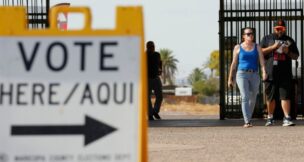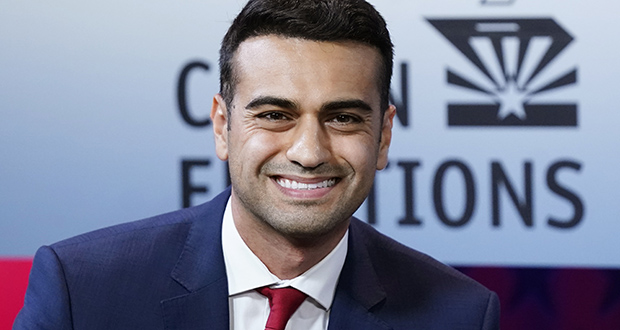UPDATED: Brewer praises budget deal, credits vetoes
Jeremy Duda//July 6, 2009//[read_meter]

By throwing down the gauntlet and vetoing large portions of the budget, Gov. Jan Brewer managed to unify the Legislature, albeit against a common enemy: Brewer herself.
Nonetheless, the governor is claiming victory in helping facilitate an agreement that came about with a swiftness and bipartisanship not normally seen at the Capitol during budget negotiations.
Brewer told the Arizona Capitol Times she is “thrilled” about the four budget bills, which passed unanimously in both legislative chambers on July 6. The talks that brought about those bills involved all parties in the budget battle except the governor, but Brewer had no doubts about the role she played.
“I was not a participant in that,” Brewer said of the budget agreement. “My hand in all of this was the veto.”
By vetoing 16 budget bills and line-item vetoing large portions of the Legislature’s main spending bill, including the general fund’s entire $3.2 billion allocation for K-12 education, Brewer said she helped lawmakers realize that they must work together in a bipartisan manner during the special session she called.
“It started today because of my veto,” she said. “We can look at today as the beginning of building a better Arizona.”
By passing a budget that includes nearly $400 million in additional funding for K-12 education, Brewer said legislators acknowledged the state’s need for revenue, a need she wants to satisfy with a temporary 1-cent sales tax increase. She said she believes now there will be enough support among lawmakers for the Legislature to put the tax hike question on the ballot in November, and suggested that they may even approve it themselves.
Four-way talks between the Republican and Democratic caucuses in each chamber began two days after the Legislature passed the four budget bills. Many lawmakers say it was indeed Brewer’s veto that finally brought them together, but with hostility still lingering over her gutting of their budget, they are not necessarily looking at the governor’s role in the same light.
“That’s absolutely correct,” Rep. John Kavanagh said of Brewer’s comments on her vetoes, “although she prompted us to work against her. I don’t know if you’d take credit for that. But at any rate, she did bring us together for a common cause of undoing what the governor did.”
Brewer’s veto wiped clean the state’s entire general fund appropriation for K-12 education, just two weeks before a $300 million payment was due to the schools, and many lawmakers worried that nearly $1 billion in federal stimulus money would be threatened by the move. Sen. John Nelson said it was the combination of Brewer’s veto and the July 15 due date that “certainly made some people wake up to the fact that there’s only one way you’re going to get it done.”
Democrats said they weren’t moved to bipartisanship by Brewer’s vetoes, though some said their Republican colleagues may have been. Legislative Democrats have spent the entire session lobbying unsuccessfully for a seat at the budget negotiations, said Rep. Steve Farley, but only got their wish after Republican dissatisfaction rose over Brewer’s vetoes.
“It was something we’ve been asking for for a long time, and the Republican legislative leaders focused on how badly she botched the veto and finally invited us to the table. And then we got things done,” the Tucson Democrat said.
Brewer said the four budget bills, which passed the House by an astonishing 47-0 vote and the Senate by votes of 23-0 and 24-0, reflect her top budget priorities by restoring nearly $400 million in funding for K-12 education. The governor also said she was assured by Senate President Bob Burns and House Speaker Kirk Adams that they will address other unresolved issues in the budget, including the need for increased revenues.
The temporary sales tax Brewer wants has met fierce resistance for the past four months, making it unlikely that lawmakers would muster the simple majority needed to put it on the November ballot, let alone the two-thirds majority needed for the Legislature to pass it outright. But by passing the four budget bills, Brewer said the Legislature essentially acknowledged that the state must generate additional revenue, which she believes bodes well for her tax-hike proposal.
“They know there’s going to have to be additional revenue. There’s no way out,” Brewer said, adding that the increased education funding they approved ensures the state will need to generate more revenue. “Now the budget is more out of whack than it was to begin with.”
Every lawmaker knows there is still a lot of work to be done on the budget, but many still were not sold on the sales tax proposal. Kavanagh did not share Brewer’s view that the increased education funding will correspond to increased support for the tax hike.
“That’s a fantasy. I mean, we still don’t have a majority, much less the two-thirds. … We didn’t go back to square one. We’re at square minus-one, because she also brought back the equalization property tax,” the Fountain Hills Republican said, referring to the property tax repeal that was among Brewer’s myriad vetoes.
Many conservatives who are hostile to any tax increase believe the only way to balance the budget is by carrying out the $600 million in budget cuts that Brewer vetoed. Sen. Jack Harper said Brewer is mistaken if she thinks the Legislature’s actions acknowledged a need to raise revenue.
“I must have missed that legislative intent clause in the bills,” quipped Harper, a Republican from Surprise.
Even if support grows for increased tax revenue, that support could lean instead toward a Democratic plan to lower the overall sales tax rate from 5.6 to 3.4 percent while expanding the base of goods and services that are taxed. Harper suggested the Democrats’ proposal would get more support for a ballot referral than Brewer’s plan, though he said he would vote against either.
“I don’t know if it still gets (31 and 16), but if the Democrats are supporting their own plan they at least start off with 12 in the Senate and 25 in the House. The governor’s plan, if the Democrats aren’t supporting it, starts off with about four in the Senate and four in the House,” Harper said. “It’s a non-starter. She’s not going to get the tax hike, I don’t think.”
Democrats, who believe Brewer’s tax hike will disproportionately impact middle-class and low-income Arizonans, certainly don’t appear to be supporting her proposal any more now than they were before the vetoes. But some are hopeful about the tax plan they pitched earlier in the session.
“We love our proposal,” said Assistant House Minority Leader Kyrsten Sinema. “If the governor feels like that action we took on Monday was a tacit approval for her sales tax proposal, I think she should probably think more about that, because Democrats have said consistently … that we think that is not a good plan for Arizona.”
Farley seemed optimistic that legislative Democrats could find the necessary support for their plan, which he referred to as “more of a long-term tax reform” proposal.
“A portion of that is certainly on the table, and we’re going to be pushing for it,” he said.
Brewer said additional spending cuts will be needed, but she said the budget cannot be balanced with cuts alone. The longer lawmakers wait to address the revenue issue, Brewer said, the worse the crisis will become.
Despite opposition from some lawmakers, Burns has called once again for the Legislature to approve Brewer’s tax increase plan, a measure of cooperation that seemed unlikely after the Senate president released a statement on July 2 that excoriated Brewer for her vetoes and questioned her abilities as governor.
Brewer, who has known Burns for more than 20 years, said, “That’s all water under the bridge.”
“Sometimes anger and frustration get the best of us,” she said. “Sen. Burns was under a lot of stress.”
During the last week of the regular session, Burns and Adams helped Brewer round up votes for her tax increase proposal. The votes never materialized, and lawmakers passed a budget that cut more than $600 million in spending without approving a special election for the tax increase. The two accused Brewer of backtracking on an agreement to sign their budget if they helped whip up Republican votes for the tax referral.
The new-found and short-lived camaraderie followed weeks of fighting between Brewer and legislative leadership. After passing a budget on June 4, three days after the governor released her own, Burns refused to send the bills to Brewer, opting to use them as a bargaining chip while avoiding a probable veto. Hostility seemed to peak when Burns walked out on budget negotiations with Brewer – he said the walkout was not meant to signal an end to discussion – prompting the governor to sue the Legislature in the Supreme Court to force the transmission of the bills.
Nearly 200 non-budget bills still await Brewer’s signature or veto, and she has until July 13 to take action before they become law automatically. Brewer said she is reviewing the bills.
“Hopefully, we’ll get signatures on those in a few days,” she said.
How the Legislature and Brewer got here: Four budget bills pass unanimously; much work remains

















